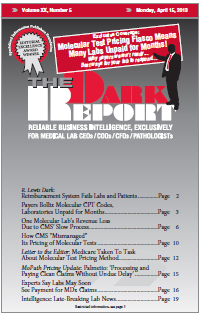CEO SUMMARY: In the fourth month of the current year, there is plenty of confusion and uncertainty over how the Medicare program will establish prices for the new molecular CPT codes and when both government and private payers will begin to regularly reimburse laboratories. As of this date, even lab billing experts and lawyers are …
Experts Say Labs May Start to Receive MDx Payments Read More »
To access this post, you must purchase The Dark Report.


